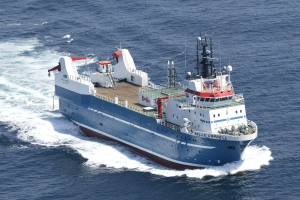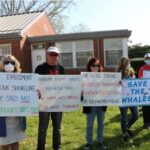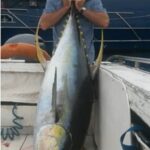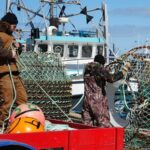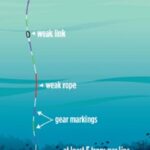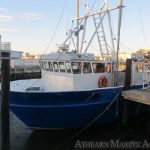Search Results for: Carlos Rafael, NMFS
Letter: Rafael stains the whole waterfront,
Congratulations to NOAA, the IRS, and the Coast Guard for taking down Carlos Rafael . His demise is cheered by the intrepid fishermen of New Bedford. The fishermen who venture hundreds of miles out to sea for many nights are loyal to their fishing tradition. They must be, to survive. If a crew member shirks, the crew must make up for his failure. No parasites at sea. The Coast Guard at Otis sleep next to their choppers, and rise up at night to go out, whether stormy, icy, foggy, or all three, to save the souls of the fishing folk. No parasites on Coast Guard choppers. Read the rest here 11:33
. His demise is cheered by the intrepid fishermen of New Bedford. The fishermen who venture hundreds of miles out to sea for many nights are loyal to their fishing tradition. They must be, to survive. If a crew member shirks, the crew must make up for his failure. No parasites at sea. The Coast Guard at Otis sleep next to their choppers, and rise up at night to go out, whether stormy, icy, foggy, or all three, to save the souls of the fishing folk. No parasites on Coast Guard choppers. Read the rest here 11:33
“F… me – that would be some bad luck!” — Carlos Rafael : Excerpts from “The Case”
Following are excerpts from the affadavit of IRS Special Agent Ronald Mullett submitted in the  of Carlos Rafael. “He [Michael] buys a lot of fish. You can become a laundromat. You’ll never find a better laundromat than this mother….” — Carlos Rafael. = = = “I could have to regret this to you [sic], because I don’t know you. You could be the IRS in here. This could be a cluster-f…. So I’m trusting you. The only thing is, I open myself because both of you is Russians and I don’t think they would have two Russians [posing as agents]. F… me – that would be some bad luck!” — Carlos Rafael,,, “Rafael said a lot! Read the rest here 18:51
of Carlos Rafael. “He [Michael] buys a lot of fish. You can become a laundromat. You’ll never find a better laundromat than this mother….” — Carlos Rafael. = = = “I could have to regret this to you [sic], because I don’t know you. You could be the IRS in here. This could be a cluster-f…. So I’m trusting you. The only thing is, I open myself because both of you is Russians and I don’t think they would have two Russians [posing as agents]. F… me – that would be some bad luck!” — Carlos Rafael,,, “Rafael said a lot! Read the rest here 18:51
Rafael arrested, feds posed as organized crime figures looking to buy him out
 The owner of one of the largest commercial fishing businesses in the northeastern United States and his bookkeeper were arrested Friday on charges of conspiracy and submitting falsified records to the federal government to evade federal fishing quotas. The charges arose out of an undercover investigation in which federal agents posed as organized crime figures interested in buying the fishing business. Carlos Rafael, 64, and Debra Messier, 60, both of Dartmouth, were charged in a criminal complaint with submitting falsified records to the federal government and conspiracy. They are scheduled to appear in US District Court in Boston at 3:30 p.m. Read the rest here 14:04
The owner of one of the largest commercial fishing businesses in the northeastern United States and his bookkeeper were arrested Friday on charges of conspiracy and submitting falsified records to the federal government to evade federal fishing quotas. The charges arose out of an undercover investigation in which federal agents posed as organized crime figures interested in buying the fishing business. Carlos Rafael, 64, and Debra Messier, 60, both of Dartmouth, were charged in a criminal complaint with submitting falsified records to the federal government and conspiracy. They are scheduled to appear in US District Court in Boston at 3:30 p.m. Read the rest here 14:04
Carlos say’s No deal for scallop vessels after new season starts March 1st!
 The sale process of his 12 New Bedford, Massachusetts-based scallop vessels and licenses — with the prospective buyer believed to be Cooke Aquaculture — is not closed and won’t close this year unless an agreement is reached by the start of the new season, which is coming up fast, he said. “There will be no deal this year if it gets to the start of the season. I do not need to sell. Maybe we can do something next year, but not this year unless we agree (to) something soon,” said Rafael, who is currently in Cape Verde, working on a new project. Read the rest here 13:43
The sale process of his 12 New Bedford, Massachusetts-based scallop vessels and licenses — with the prospective buyer believed to be Cooke Aquaculture — is not closed and won’t close this year unless an agreement is reached by the start of the new season, which is coming up fast, he said. “There will be no deal this year if it gets to the start of the season. I do not need to sell. Maybe we can do something next year, but not this year unless we agree (to) something soon,” said Rafael, who is currently in Cape Verde, working on a new project. Read the rest here 13:43
Carlos Rafael in talks to sell scallop vessels to Canadian Cooke Aquaculture
 In a deal put together by Sam Daniels, currently president of Wanchese and one of the owning families, Canadian salmon farmer Cooke is also in talks to buy Rafael’s 12 New Bedford-based scallop vessels, sources said. For Rafael, part of the deal is that the vessels leave Massachusetts. “I don’t want them to bring in $1 for this state again.” He then plans to sell his fleet of 37 working groundfish vessels, he said. This would leave only 11 left in the port. What a guy! Read the rest here 17:46
In a deal put together by Sam Daniels, currently president of Wanchese and one of the owning families, Canadian salmon farmer Cooke is also in talks to buy Rafael’s 12 New Bedford-based scallop vessels, sources said. For Rafael, part of the deal is that the vessels leave Massachusetts. “I don’t want them to bring in $1 for this state again.” He then plans to sell his fleet of 37 working groundfish vessels, he said. This would leave only 11 left in the port. What a guy! Read the rest here 17:46
Carlos Rafael , the “Don” of the New England Groundfishery, says he was cheated
 Between endless phone calls and Winston cigarettes, Carlos Rafael fumed as he recounted the call early in October: The fisheries disaster relief headed his way would be just half the amount he was originally told was his. For the don of the North Atlantic groundfishing industry, it was the second time in six years he said he was cheated out of federal funds. Read the rest here 09:47
Between endless phone calls and Winston cigarettes, Carlos Rafael fumed as he recounted the call early in October: The fisheries disaster relief headed his way would be just half the amount he was originally told was his. For the don of the North Atlantic groundfishing industry, it was the second time in six years he said he was cheated out of federal funds. Read the rest here 09:47
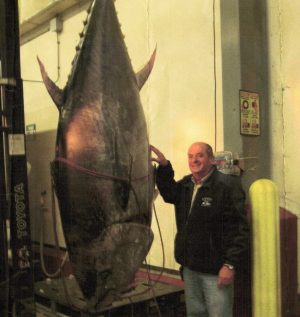
“The maggots screaming on the sidelines, they’re done. They can scream all they want. Nobody can save them,” Carlos Rafael
Carlos Rafael and His Fish Are the American Dream???
Rafael is currently railing against the lobbying effort of the smaller New England groundfishermen who he says are trying to put a cap on the amount of permits one individual can own. “They are like mosquitoes on the balls of an elephant,” he says of the smaller operations in the port. “Biting, biting, biting, until finally [the government] is going to say (edited) off, we got to do something.” They’re screaming anyway. Smaller fishermen want federal regulators to change the rules, saying it unfairly benefits the large operations like Rafael. This pisses him off. Why should he be punished for his business acumen, he asks? continued
4 comments
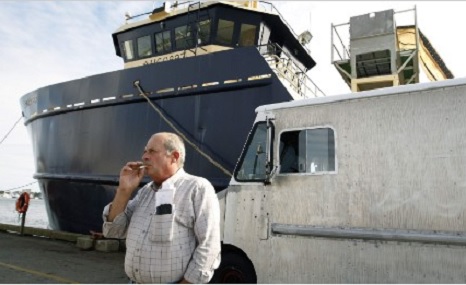
The ‘Codfather’ was a seafood kingpin, until fake Russian mobsters took him down.
Though he estimated his net worth at $10 million to $25 million, he still walked the creaky, bait-scented wharves in flannel shirts and worn jeans every day, barking out commands and alternating between foul-mouthed English and rapid-fire Portuguese as he chain-smoked Winston cigarettes and monitored the day’s catch. That all changed in 2016, when federal authorities revealed that Carlos Rafael was at the center of a sprawling criminal investigation involving fake Russian mobsters, fraudulent haddock and duffel bags of cash. >click to read< 14:37
A page of stories about the case, like this one, “F… me – that would be some bad luck!” — Carlos Rafael : Excerpts from “The Case” – >click to read<
The Shutdown
Don Cuddy
The National Marine Fisheries Service shut down Sector IX because the majority of its boats and quota belong to Carlos Rafael. This came without warning last November 22 and the order also waived the customary 30-day delay in effectiveness. Far from resolving anything this has exacerbated a bad situation by throwing a widening circle of business owners under the bus as the weeks drag by.
The bulk of Bay Fuel’s business came from the boats in Sector IX. At sea a New Bedford dragger will use around 600 gallons of diesel a day but fuel consumption literally dried up after NMFS ended the sector’s operations. “I’ve lost half a million dollars since November plus I’ve had to invest over $1 million in the last couple of years to build a government-mandated fuel barge that I’m still paying for,” said Martins, who is now Sector IX president. Bay Fuel is not the only shoreside business feeling the stress. Over at Crystal Ice winter groundfishing enables Joe Swift to keep his workers on the payroll year-round while the scallop fleet remains largely inactive. “It’s hurting us. I can’t lay my guys off. In the summer we put out five to six hundred tons of ice daily. It takes an experienced crew to do that,” he said. “If I lay people off then I might not get them back.”
The shutdown came at the heart of the winter fishing season. Tor Bendiksen of Reidar’s Manufacturing, a family-owned business now facing a perilous future, orders his net-making gear and supplies months in advance and only gets paid by fishermen when boats land their fish. But there won’t be any fish. “I have my suppliers calling in their notes and I sent my bills out to the boats but they can’t pay,” he said. “Now what? After a while the bank will come and say ‘We’re taking this from you’. It could all collapse and it won’t take long. In three or four months it could all be gone.”
There is a lot of anxiety building among the captains and crewmembers of the Sector IX boats whose jobs have essentially been eliminated. Tony Fernandes is the captain of the dragger Vila Nova do Corvo I.
“I’ve got a son in college, a house payment, car payment,” he said. “We’re scraping whatever we have put aside to pay that until we resolve this mess. They’re punishing the little guy. They should have taken their time and worked this out.”
The big fear is that with no fresh product on the dock suppliers will turn to the frozen market to meet demand. “If we lose our market because of this shutdown we are going to have a hard time getting it back,” said Sean Machie, captain of the Apollo.
The jobs that are lost are almost exclusively those of head of household earners, Kevin Rocha said. “It makes a big, big dent. Whether you are a captain, a boat owner or shoreside support, we all eat out of that same fish hold.”
If it continues the shutdown could also have far reaching effects that do not seem to have been considered, Richie Canastra said. “The only way you can get training as a fishermen is by being on a vessel and the captain is the teacher,” he said. The twenty active Sector IX boats represent the bulk of the groundfish fleet. “A lot of the captains are older. If these boats don’t go back out where is anyone going to learn how to fish?”
There is also a sense of grievance along the waterfront that NMFS is pursuing such a hard line with respect to overages on certain species when every year the fishermen give back approximately two million pounds of haddock that they are unable to catch because of regulatory constraints, with only a ten percent carryover of that quota applied to the following fishing year. Meanwhile we are importing frozen fish from Norway and Russia. Somebody needs to take ownership of this mess before it leaves a trail of destruction in this city. The clock is ticking.
FishNet USA/NOAA Enforcement, media bias, and what’s fact checking?
16:44 3/8/2016
Much attention has been directed towards a recent IRS/NOAA investigation of alleged criminal activity of New Bedford (MA) fleet owner/seafood wholesaler and retailer Carlos Rafael. Particularly considering the fact that NOAA is trying to force New England fishermen to shoulder the onerous burden of paying for on-board observers to make sure that they aren’t “cheating” on federal fishing regulations, some industry observers have called into question the timing of the actions surrounding Mr. Rafael’s business dealings, and I’ll bet dollars to donuts that the anti-fishing activists are going to leap on this opportunity to clamor for even more – and even more expensive policing of fishermen (it’s been estimated that the costs of the existing level of observer coverage, if passed on to fishermen, will force on the order of 25% of New England’s groundfish fleet out of business).
In view of all of the interest in Mr. Rafael’s “case,” and in the amount of media attention it’s likely to generate, I thought it would be instructive to redistribute a piece I wrote in response to an article a writer named Brendan Borrell wrote for Bloomberg Business Week. In my estimation virtually everything that’s wrong with most media coverage of fisheries issues today is exemplified by Mr. Borrell.
As far as I could determine, there has been no long term follow-up to the findings/recommendations of the Inspector General’s investigation or any other investigations detailed below as far as the functioning of NOAA’s Office of Law enforcement is concerned.
The IRS has also been involved in the Rafael case. Unfortunately, I would consider that reporting as performed by Mr. Borrell is still the rule rather than the exception when it comes to fishing
For the record, I have never met Mr. Rafael and to my knowledge have had no dealings, either personal or professional, with either him or with any of the people who work for him. Nils E. Stolpe
Who really “destroyed a decade of law enforcement?” FishNet USA/December 28, 2011 Nils E. Stolpe
In the last week of November Bloomberg Businessweek on the MSNBC website posted an article titled “The Gloucester Fish War – How a small town in Massachusetts destroyed a decade of law enforcement,” by Brendan Borrell.
Mr. Borrell’s point seemed to be that something approaching a conspiracy by Gloucester fishing interests, local, state and federal politicians, the Gloucester Daily Times and the Inspector General’s office in the US Department of Commerce victimized the entire federal fisheries enforcement process in the Northeast. Reminiscent of the horse operas of yesteryear, National Oceanic and Atmospheric Administration enforcement personnel, wearing the white hats à la such stalwarts as John Wayne and Jimmy Stewart, gave their all to fighting the good fight; but rather than rustlers or bandits they were fighting fishermen from a community where cheating was an accepted way of life.
Given the title of his article, it will come as no surprise to anyone that Mr. Borrell painted the hats that the fishermen – and their supporters – wear a pretty unequivocal black.
Did Mr. Borrell get the right hats on the right heads? Having been a fairly close observer of the situation as it unfolded, I would have to answer that he wasn’t even close. And putting together the observations of a number of eminently qualified people and organizations who were directly involved in several connected investigations, people with no particular ax to grind, I’d suggest that they would agree with me. My purpose here is to lay out all of the information that seems to have escaped Mr. Borrell’s notice and let the folks who read this decide for themselves.
But before getting into that, let’s take a look at some of Mr. Borrell’s factual content, the kind of stuff that, particularly with today’s access to the internet, is so easy to get right.
Georges Bank? The Grand Banks? Newfoundland? Massachusetts? Collapsing stocks? Record recruitment? Haddock? Cod? They’re kind of all the same, aren’t they?
The story starts out with a “raid” on the Gloucester Seafood Display Auction on December 6, 2006. Wearing bullet proof vests instead of buckskin and armed with Glock semi-automatic pistols instead of six shooters, 16 federal agents descended on the auction with a U-Haul to cart off three years of business records in an attempt to prove wrongdoing on the part of “mustached” (I’ll get back to this later) Larry Ciulla, the founder and CEO of the auction.
Mr. Borrell wrote “at the time of the raid (December 7, 2006), cod, haddock, flounder, and other groundfish, which are all caught by dragging a net along the ocean bed, were being harvested so heavily that the stock was in danger of collapsing, as it seems to have in the much larger Georges Bank off Newfoundland.”
Considering that Georges Bank is off Cape Cod, and has been since it was deposited there by a withdrawing glacier at the end of the last ice age, I’ll have to assume that Mr. Borrell really meant to write “…in the much larger Grand Banks off Newfoundland.” Considering that most of the groundfish landed in Gloucester are caught on Georges Bank, he must have been referring to the “cod, haddock, flounder, and other groundfish” there.
The National Oceanic and Atmospheric Administration (NOAA)/National Marine Fisheries Service (NMFS) Northeast Fisheries Center’s website shows that recruitment of Georges Bank haddock was at the highest point ever measured in 2003, and that in 2006 the biomass of haddock on Georges Bank was approaching a corresponding record level. Acadian redfish – another groundfish – were mostly unfished in 2006. Landings were over 100,000 metric tons in the early 1950s but had plummeted to less than 500 mt in 2006. According to trawl surveys their abundance. like haddock, was approaching record levels. Cod and (yellowtail and winter) flounder stocks weren’t in as good shape as haddock or redfish, but to write that the entire groundfish stock on Georges Bank was in danger of collapsing is stretching the truth to epic proportions.
Unfortunately, we’ve become used to such “inaccuracies” in reporting on the condition of our fisheries. Why, after all, should something like accuracy intrude on a good story line or a particular agenda?
According to the author, the intent of this NOAA “raid” was to send the “overfishing doesn’t pay” message to the fishermen of Gloucester.
That it was necessary to get this message to Gloucester’s fishermen was required because, according to Mr. Borrell, University of Maryland economist Dennis King “estimated that 12 percent to 24 percent of the total trawl catch in the Northeast was illegal.”
The Pew Trusts – what are the odds?
This probably won’t come as a surprise to my regular readers, but Dennis King’s work was funded by the Lenfest Ocean Program, which is administered by the Pew Charitable Trusts.
I wrote a critique of Dr. King’s illegal fishing research, which he accomplished with John Sutinen at the University of Rhode Island (it’s available at http://www.fishnet-usa.com/All%20Stolpe%20Columns.htm#Law%20enforcement). In a footnote, Drs. King and Sutinen wrote “interviews with NOAA enforcement staff and others familiar with this database indicate that in many cases enforce-ment officers have probable cause to inspect for a violation and, if after inspecting they decide to report a violation, it probably is a violation even though it may not be prosecuted or have a resolution that results in a penalty.” Then “based on this criterion, 1,614 of the 1,689 incidents (95.6%) reported during this period probably are actual vio-lations and, for purposes of this analysis, will be treated as actual violations.” Applying this “you’re guilty because we suspect you’re guilty, regardless of whether you’re charged or convicted” attitude seems to be a pretty shaky reason to indict an entire fishing community, but that surely didn’t interfere with Mr. Borrell’s story.
“Enrichment” is a subjective kind of thing Underlying Mr. Borrell’s “Fish War” and his destruction of “a decade of law enforcement,” is an investigation of federal fisheries enforcement in the Northeast and nationally by the U.S. Department of Commerce Office of Inspector General (OIG). This investigation, which was called for by Members of Congress, local and state government officials and seafood industry members alike, brought to light significant problems that were endemic to the way that Administrative Law Judges, NOAA administrators, enforcement agents and attorneys had been persecuting (note that I didn’t use “prosecuting”) fishermen and people in related businesses who they felt were violators (as did Drs. King and Sutinen above), and benefiting from that persecution in the process.
Mr. Borrell wrote of the investigation “no agents were enriched, and the most significant problems that the Inspector General’s report identified were with the regulations themselves.” Much of the OIG investigation focused on the NOAA Asset Forfeiture Fund (AFF), which was composed of fines either paid by people/businesses that violated federal fisheries laws or funds that resulted from the sale of assets – mostly fish and other seafood – that were forfeited by those people/businesses. How those funds can be used was specified by Congress in the Magnuson-Stevens Fishery Conservation and Management Act (MSFCMA).
But a financial audit isn’t
The OIG brought in the international accounting firm KPMG to perform a forensic audit of the AFF. Though the funds available wouldn’t cover a full audit, among KPMG’s findings were: • AFF’s current balance likely falls within a broader range. Based on complicated definitional, data analysis, and reconciliation efforts, KPMG found that during the period of its forensic review (January 1, 2005, through June 30, 2009), the AFF received approximately $96 million (including interest on prior balances), while expending about $49 million through over 82,000 transactions. This analysis suggests that the balance could be much higher than $8.4 million; however, NOAA must review KPMG’s analysis and de-termine what a more accurate figure may be. NOAA should work with the Department to better define the fund and determine its balance. • KPMG’s findings show that NOAA has administered the AFF in a manner that is neither transparent nor conducive to accountability, thus rendering it susceptible to both error and abuse. • Regarding purchase cards issued to nearly all OLE special agents and enforcement officers, KPMG tested all purchase card transactions where the monthly total value purchased from any single vendor had a value above $3,000. KPMG selected 394 for further review, of which 54 percent (totaling approximately $204,000) did not have required supporting documentation. • KPMG found that 62 percent of 604 transactions it selected for further analysis (i.e., document review) did not have required supporting documentation, and 27 percent did not have required approvals. • OLE policy authorizes AFF expenditures for vehicle leasing and rentals, but does not include authorization of AFF expenditures for vehicle purchases. OLE’s vehicle inventory as of June 1, 2010, lists 202 vehicles, only two of which are leased. According to OLE, the other 200 were purchased at a cost of about $4.6 mil-lion, predominantly with AFF monies. OLE’s 202 vehicles exceed by a substantial margin its staffing of approximately 172 enforcement personnel. • Between January 2005 and June 2009, OLE and GCEL charged nearly $580,000 to the AFF for interna-tional travel to over 40 destinations. However, only about 17 percent of the cost for this travel was directly related to specific investigations or enforcement proceedings (the only MSFCMA authorized expenditures for these funds), according to NOAA records. The remaining 83 percent of the cost for such travel was for the purpose of training or attending meetings. For example, in 2008, 15 OLE and GCEL employees traveled to Norway to attend the week-long Global Fisheries Enforcement Training Workshop, at a cost of $109,000. Mr. Borrell writes that an almost $100 million unaudited “slush fund” provided by fines levied on fishermen in the government agency charged with enforcing federal fishing regulations and having no effective limits on how the money was spent was not among the most significant problems identified in the Inspector General’s report. And he continues “no agents were enriched,” in spite of the fact that government agents and attorneys benefited from foreign travel for professional development, had lax (or no) “bothersome” controls on spending a whole bunch of money, and had what appears to be unlimited access to government vehicles bought with those funds. I’ve worked as a government bureaucrat and at the time, if I were offered the chance to be freed of purchasing controls, to have a vehicle permanently assigned to me and to be offered foreign travel for training and professional development, I would have certainly considered myself enriched.
And neither is having a workforce that is overqualified (and overpaid) for the work it’s performing. In addition to the Department of Commerce Inspector General’s office problems with the Asset Forfeiture Fund, the report also noted that “NOAA needs to reassess its OLE (Office of Law Enforcement) workforce composition (presently 90 percent criminal investigators), to determine if this criminal-enforcement-oriented structure is the most effective for accomplishing its primarily regulatory mission. Based on OLE’s data, its caseload from January 1, 2007 through June 30, 2009, was about 98 percent noncriminal…. There are also indications in the record that this workforce composition was driven by considerations of the better pay and benefits that apply to federal criminal investigators, rather than by strict mission requirements.”
Perhaps Mr. Borrell doesn’t consider that better pay and benefits for a workforce that is almost completely out of balance with the work it is required to do amounts to personal enrichment either.
NOAA enforcement was “dismantled” by one man?
In his zeal to implicate anyone or anything in wrongdoing other than NOAA, Mr. Borrell wrote “(Larry) Ciulla’s success in dismantling NOAA’s enforcement helped other fishermen.” While Mr. Borrell wants his readers to believe that the fisheries enforcement problems were limited to the Gloucester Seafood Display Auction and the fishermen of Gloucester, the Inspector General’s report stated “in short, we found systemic, nationwide issues adversely affecting NOAA’s ability to effectively carry out its mission of regulating the fishing industry. These issues have contributed significantly to a highly-charged regulatory climate and dysfunctional relationship between NOAA and the fishing industry—particularly in the Northeast Region (the Northeast Region extends from Cape Hatteras in North Carolina to the Gulf of Maine).” He also implies that a demonstration that was held in the parking lot of the NOAA/NMFS administrative headquarters building in Gloucester was a “local” effort focusing on local problems. To the contrary, there were fishermen there and participating from fishing ports extending from Maine to New Jersey.
As the statements that were the results of all of the investigations make abundantly clear, neither Mr. Ciulla, the fishermen of Gloucester, nor other fishermen anywhere else were responsible for anything other than drawing national attention to problems that NOAA enforcement personnel and their higher-ups in the agency brought upon themselves. That’s what accounted for the “dismantling,” not Mr. Ciulla’s nor any other private citizen’s actions.
And that diminished “NOAA’s will to regulate?”
Mr. Borrell also wrote “as seems to have been the intention, the called-for investigation successfully diminished NOAA’s will to regulate.”
In his own words “…Ciulla no longer has to pay an $85,000 agreement he made to settle a trio of cases that dated back a decade. The ‘auction was clearly the target of selective enforcement and subject to excessive fines,’ the judge (appointed Special Master and retired federal judge Charles B. Swartwood, III) wrote.” Here a federal enforcement agency and its personnel were caught with their hands in the symbolic cookie jar up to their symbolic elbows and he describes the agency’s reaction as a diminished will to regulate? And that this was the intention of the citizens and their elected officials in clamoring for the investigation? And that those carrying out the investigations were somehow manipulated into enabling this bizarre campaign?
How about, much more simply, that people in the seafood industry nationally, but most particularly from Maine to North Carolina, were tired of being pushed around and manipulated by an out-of-control bureaucracy that benefited from the inflated fines that it’s conflicted, inadequately controlled personnel forced on them, went to their elected officials and finally got some high level attention focused on what had become a festering problem?
We’re from the government and we’re here to destroy your life.
Mr. Borrell wrote of “a precedent-setting case against a scalloper named Larry Yacubian, who was accused of fishing in closed waters. The case was the first to use satellite technology to track the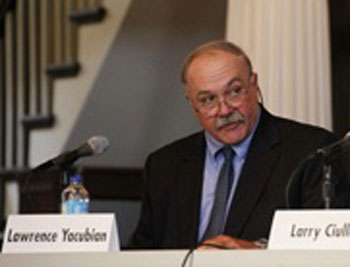 position of fishing boats. Yacubian settled with the agency for $430,000, a loss that forced him to sell his boat and home. It was a major coup for NOAA and was supposed to mark the beginning of a new, more accountable fishing industry.” He then quoted an attorney in the Justice Department’s environmental crimes section “they (NOAA) have gotten some of the most sophisticated cases with some of the highest sentences I have seen in wildlife crime cases.” What he neglected to mention was that the “home” Mr. Yacubian was forced to sell – to pay for his fine and his legal fees – was the Quansett Farm in Westport, Massachusetts. This farm had been in his wife’s family since her ancestor Job Almy, built it in 1742. Mr. Yacubian, a lifelong fisherman, also lost his fishing permits. He and his family relocated to Florida.
position of fishing boats. Yacubian settled with the agency for $430,000, a loss that forced him to sell his boat and home. It was a major coup for NOAA and was supposed to mark the beginning of a new, more accountable fishing industry.” He then quoted an attorney in the Justice Department’s environmental crimes section “they (NOAA) have gotten some of the most sophisticated cases with some of the highest sentences I have seen in wildlife crime cases.” What he neglected to mention was that the “home” Mr. Yacubian was forced to sell – to pay for his fine and his legal fees – was the Quansett Farm in Westport, Massachusetts. This farm had been in his wife’s family since her ancestor Job Almy, built it in 1742. Mr. Yacubian, a lifelong fisherman, also lost his fishing permits. He and his family relocated to Florida.
While he did note that “scallop fisherman Yacubian is slated to get back $400,000 he paid in 2005,” Mr. Borrell also neglected to mention that the Honorable Charles B. Swartwood, III, the Special Master who was appointed to review a number of cases prosecuted by NOAA, determined that “the timing and circumstances of ALJ (U.S. Coastguard Administrative Law Judge) McKenna’s involvement in this (Larry Yacubian’s persecution/prosecution) case gives credence to the perception that, in general, the Coast Guard Administrative Law Judges are biased in favor of NOAA and in particular, that ALJ McKenna was biased in this case which, in turn, allowed EA (NOAA Enforcement Attorney) Juliand and EA MacDonald to extract an excessive settlement from Mr. Yacubian.” He recommended that “Mr. Yacubian be reimbursed the total sum of $330,000 as follows: $210,000, which was coerced in return for permission to sell the Independence (Mr. Yacubian’s scallop vessel), with its permit and $110,000 representing the excessive monetary penalty paid.” Of course that didn’t get the Quansett Farm back, but apparently in Mr. Borrell’s view, mentioning such “minor” points isn’t as important as keeping his good guy/bad guy fantasy intact.
The Special Master reviewed 31 cases that had been handled by NOAA Enforcement Agent Andrew Cohen, and ordered that $650,000 be returned to 11 fishermen.
Perhaps NOAA enforcement personnel didn’t all deserve Brendan Borrell’s white hats.
Below are some quotes concerning what it seems impossible to think of as anything less than endemic and wide-spread problems in NOAA enforcement:
• “Of the 27 complaints we examined, we confirmed 9—including cases involving false information in an affidavit for an inspection warrant; entry into a facility for other than authorized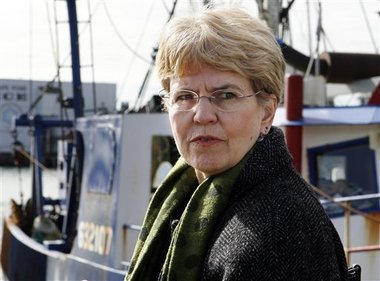 purposes; excessive fines, including for first-time violators; and comparatively steep assessed penalties in the Northeast Region which leverage set-tlement while deterring respondents from taking their cases to hearing.” (USDOC, Report No. OIG-19887-2, 09/2010). • “The AFF (Asset Forfeiture Fund) has not functioned as a coherent program, despite being a substantial source of agency operational funding―outside and supplemental to annual appropriations―drawn solely from the proceeds of NOAA enforcement actions against industry parties. Rather, as KPMG found, the AFF has operated through poorly defined, disjointed, and inconsistent processes that lack effective internal controls, and for which no single NOAA office appears to be in charge or accountable because it is so decentralized.” Memo from USDOC Inspector General Todd Zinser to NOAA Chief Jane Lubchenco, 07/01/2010). • “As a result of my investigation, I have found conduct… which amounted to overzealous, abusive or arbitrary conduct by NOAA personnel which unfairly impacted the outcome of several of the reviewed cases. Some of the inappropriate conduct which I have uncovered during my investigation was not known to the OIG when it concluded its investigation.” (Report And Recommendation Of The Special Master Concerning NOAA En-forcement Action Of Certain Designated Cases, 04/2011). • “As the top cop at NOAA and a longtime investigator himself, Dale Jones must be acutely aware that shredding documents during a federal investigation raises serious questions about his commitment to a full and fair look at all the facts,” (House Oceans and Wildlife Subcommittee Chairwoman) Madeleine Bordallo (D-Guam) said at a subcommittee hearing on the issue yesterday.” NY Times, 03/04/2010). • (Congressman Walter B.) “Jones (R-NC) Praises Dismissal Of Fisheries’ Top Cop-Says Much More Needs To Be Done.” (headline of press release from Congressman Jones, 04/09/2010). • “(NOAA Enforcement Agent Andrew) Cohen’s June 19, 2009, press release (that was provided to the Boston Globe four hours before anyone at the auction was notified) stated that ‘NOAA is now notifying the auction it must comply with the 2003 agreement’s terms and serve the 10-day sanction, effectively shutting down the auc-tion to federally managed fish for 10 days.’ The auction at the time had filed a federal court appeal of NOAA’s sanction decision, which precluded Cohen’s enforcement of the appealed order — and brought the matter to (U.S. District Court Judge Douglas) Woodlock’s courtroom. Woodlock chastised Cohen and NOAA for the tac-tics. NOAA never followed with news releases that reported the judge’s
purposes; excessive fines, including for first-time violators; and comparatively steep assessed penalties in the Northeast Region which leverage set-tlement while deterring respondents from taking their cases to hearing.” (USDOC, Report No. OIG-19887-2, 09/2010). • “The AFF (Asset Forfeiture Fund) has not functioned as a coherent program, despite being a substantial source of agency operational funding―outside and supplemental to annual appropriations―drawn solely from the proceeds of NOAA enforcement actions against industry parties. Rather, as KPMG found, the AFF has operated through poorly defined, disjointed, and inconsistent processes that lack effective internal controls, and for which no single NOAA office appears to be in charge or accountable because it is so decentralized.” Memo from USDOC Inspector General Todd Zinser to NOAA Chief Jane Lubchenco, 07/01/2010). • “As a result of my investigation, I have found conduct… which amounted to overzealous, abusive or arbitrary conduct by NOAA personnel which unfairly impacted the outcome of several of the reviewed cases. Some of the inappropriate conduct which I have uncovered during my investigation was not known to the OIG when it concluded its investigation.” (Report And Recommendation Of The Special Master Concerning NOAA En-forcement Action Of Certain Designated Cases, 04/2011). • “As the top cop at NOAA and a longtime investigator himself, Dale Jones must be acutely aware that shredding documents during a federal investigation raises serious questions about his commitment to a full and fair look at all the facts,” (House Oceans and Wildlife Subcommittee Chairwoman) Madeleine Bordallo (D-Guam) said at a subcommittee hearing on the issue yesterday.” NY Times, 03/04/2010). • (Congressman Walter B.) “Jones (R-NC) Praises Dismissal Of Fisheries’ Top Cop-Says Much More Needs To Be Done.” (headline of press release from Congressman Jones, 04/09/2010). • “(NOAA Enforcement Agent Andrew) Cohen’s June 19, 2009, press release (that was provided to the Boston Globe four hours before anyone at the auction was notified) stated that ‘NOAA is now notifying the auction it must comply with the 2003 agreement’s terms and serve the 10-day sanction, effectively shutting down the auc-tion to federally managed fish for 10 days.’ The auction at the time had filed a federal court appeal of NOAA’s sanction decision, which precluded Cohen’s enforcement of the appealed order — and brought the matter to (U.S. District Court Judge Douglas) Woodlock’s courtroom. Woodlock chastised Cohen and NOAA for the tac-tics. NOAA never followed with news releases that reported the judge’s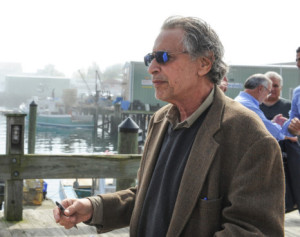 repudiation of Cohen’s efforts, or the settlement on terms favorable to the auction.” (R. Gaines, The Gloucester Daily Times, 09/21/2010) • “U.S. Commerce Secretary Gary Locke announced today that $649,527 in fisheries enforcement penalties will be returned to 11 individuals or businesses after an independent review of their cases concluded the NOAA en-forcement program had in some instances “overstepped the bounds of propriety and fairness.” In his decision memo issued today, Secretary Locke acted on 30 cases reviewed by the Special Master, Judge Charles Swart-wood III, accepting all of his recommendations that the law allows and taking additional actions in several cases. Secretary Locke appointed Judge Swartwood to conduct the independent review of cases identified by the Department of Commerce’s Inspector General as problematic. The individuals and businesses will receive their remittances within 30 days of receipt of payment information.” (From a Department of Commerce Press release on May 17, 2011) • “Federal law enforcement officials buy a $300,000 luxury boat and can’t document that it’s used for work.” From the website of Iowa Senator Chuck Grassley) The Secretary of Commerce, a retired federal judge, a sitting federal judge, the head of the Department of Commerce’s internal watchdog agency, an official report of an investigation by that agency, participants in a Congressional hearing and Members of Congress from both sides of the aisle representing constituencies far from Gloucester are on the record with thousands of words which can’t be looked at as anything less than a scathing indictment of NOAA enforcement’s operations and attitudes going back for years, and Mr. Borrell actually tries to convince his readers that this was all part and parcel of an effort to undermine NOAA’s enforcement capabilities in Gloucester.
repudiation of Cohen’s efforts, or the settlement on terms favorable to the auction.” (R. Gaines, The Gloucester Daily Times, 09/21/2010) • “U.S. Commerce Secretary Gary Locke announced today that $649,527 in fisheries enforcement penalties will be returned to 11 individuals or businesses after an independent review of their cases concluded the NOAA en-forcement program had in some instances “overstepped the bounds of propriety and fairness.” In his decision memo issued today, Secretary Locke acted on 30 cases reviewed by the Special Master, Judge Charles Swart-wood III, accepting all of his recommendations that the law allows and taking additional actions in several cases. Secretary Locke appointed Judge Swartwood to conduct the independent review of cases identified by the Department of Commerce’s Inspector General as problematic. The individuals and businesses will receive their remittances within 30 days of receipt of payment information.” (From a Department of Commerce Press release on May 17, 2011) • “Federal law enforcement officials buy a $300,000 luxury boat and can’t document that it’s used for work.” From the website of Iowa Senator Chuck Grassley) The Secretary of Commerce, a retired federal judge, a sitting federal judge, the head of the Department of Commerce’s internal watchdog agency, an official report of an investigation by that agency, participants in a Congressional hearing and Members of Congress from both sides of the aisle representing constituencies far from Gloucester are on the record with thousands of words which can’t be looked at as anything less than a scathing indictment of NOAA enforcement’s operations and attitudes going back for years, and Mr. Borrell actually tries to convince his readers that this was all part and parcel of an effort to undermine NOAA’s enforcement capabilities in Gloucester.
But then again… and here we hear from some more Pew folks.
In his effort to minimize the significance of the results of an OIG investigation, an audit by an international accounting firm, a review of the most obviously questionable NOAA Enforcement 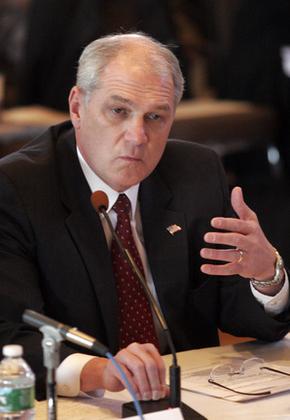 prosecutions and a Congressional hearing or two, Mr. Borrell wrote that the Executive Director of the Marine Fish Conservation Network pointed out “that the number of complaints from fishermen that had any merit was “‘comparatively small.”’ The Marine Fish Conservation Network has received almost $5 million from the Pew Trusts. He continued “King, the (Pew/Lenfest funded) economist, says the findings of the Inspector General were misconstrued and blown out of proportion, and he says the industry needs more, not less, enforcement. ‘“This was political theater driven by a handful of fishermen.’” I have to emphasize that it wasn’t a fisherman, or a handful of fishermen, who carried out the file-shredding extravaganza in the midst of an investigation by the Department of Commerce Inspector General’s office, it was Dale Jones, the head of NOAA enforcement. That’s not political theater, it’s Cinéma vérité at its most real, and the people doing the driving weren’t a handful of fishermen, they were the people in charge at NOAA.
prosecutions and a Congressional hearing or two, Mr. Borrell wrote that the Executive Director of the Marine Fish Conservation Network pointed out “that the number of complaints from fishermen that had any merit was “‘comparatively small.”’ The Marine Fish Conservation Network has received almost $5 million from the Pew Trusts. He continued “King, the (Pew/Lenfest funded) economist, says the findings of the Inspector General were misconstrued and blown out of proportion, and he says the industry needs more, not less, enforcement. ‘“This was political theater driven by a handful of fishermen.’” I have to emphasize that it wasn’t a fisherman, or a handful of fishermen, who carried out the file-shredding extravaganza in the midst of an investigation by the Department of Commerce Inspector General’s office, it was Dale Jones, the head of NOAA enforcement. That’s not political theater, it’s Cinéma vérité at its most real, and the people doing the driving weren’t a handful of fishermen, they were the people in charge at NOAA.
To really separate the good guys from the bad guys….
Mr. Borrell appears to go to significant lengths to draw as stark a contrast as possible between members of the fishing industry and the NOAA enforcement machine. He starts out with “mustached” Larry Ciulla, who he also describes as “the former bad boy,” a “thrill seeker” who bought a Corvette, took flying lessons, risked life and limb in the greasy pole competition each June at the St. Peter’s Fiesta in Gloucester and “married the former Ms. Massachusetts Petite America.”
He also refers to the auction’s “curly-haired bookkeeper,” who when questioned by the bulletproof vest wearing, Glock brandishing NOAA enforcement agents about the location of records, responded “I’m not saying anything.” He later mentions that she “recently answered the phone at the Exchange” (that’s the Cape Cod Seafood Exchange, which took over the Gloucester auction site after it filed for bankruptcy) and said “she does not have current contact information for Ciulla.”
Levels of complexity and more Pew Trusts $millions
And then he writes “if politicians and the local media painted Ciulla as the face of an honest businessman battered by overzealous regulators, the situation behind the scenes was more complex.” The complexity is a suit filed by Eric Hesse and another fisherman “against Ciulla in federal court, demanding $1 million for breach of contract and deceptive business practices over six years.” Eric Hesse is the Chairman of the Board of the Cape Cod Commercial Hook Fishermen’s Association (CCCHFA). The CCCHFA has received over one and a half million dollars from the Pew Trusts. Then, “on Oct. 4, Hesse’s lawyer—a partner in the firm that once represented Ciulla—brought a class action against the auction, adding two named defendants and alleging the auction violated the Racketeer Influenced and Corrupt Organizations (RICO) Act.” “More complex” might be a world-class understatement.
Fancy cars, fast living, beautiful women, curly hair, mustaches and a lawsuit based on the violation of the Racketeer Influenced and Corrupt Organizations Act; what kind of Hollywood inspired connections come to mind?
Contrast this with Mr. Borrell’s treatment of the NOAA enforcement people as victims of their war with what he wants us to think of as the illegal fishermen of Gloucester and their supporters. Compare his treatment of Larry Ciulla to that of Enforcement Agent Andy Cohen. While Mr. Borrell had Mr. Ciulla, the “former bad boy” driving flashy cars, flying airplanes, marrying beauty/talent contest winners and recklessly risking life and limb, Agent Cohen was fishing from a kayak or spending time in Haiti “with an aid organization.” There’s not much of a question of who Mr. Borrell wants us to think should be wearing the white hats, is there?
Last but certainly not least
In the program of 2nd International Marine Conservation Congress held in Victoria, BC, Canada in May of 2011, Brendan Borrell is listed as a grantee of the Communication Partnership for Science and the Sea (COMPASS) Journalist Fellowship Program (along with fellow Society of Environmental Journalists members Juliet Eilperin and Jeff Burnside – see my In the Belly of the Big Green Beast at http://www.fishnet-usa.com/In_Belly_Of_Beast.pdf).
COMPASS has received over $2.6 million from SeaWeb, which was created by the Pew Trusts and has received over $17 million from the Pew Trusts and the Packard Foundation.
So.…
From the title of his article onward, at the most superficial level it’s impossible to come away from Mr. Borrell’s over 3,000 words without the feeling that NOAA enforcement, whose agents and attorneys were the only things protecting the Northeast groundfish fishery, was victimized by the Gloucester fishing industry and its allies. Only by being familiar with an admittedly complicated situation or by doing significant background research does it become evident how much he downplayed the degree to which members of Gloucester’s and much of the rest of U.S.’s fishing industry had been “victimized” by NOAA enforcement, and he totally missed the connections of so many of his sources to the Pew Trusts, a multi-billion dollar foundation that has spent hundreds of millions of dollars in furthering what many people consider an anti-fishing agenda. This, the rest of the story, should shed some much needed light on what it’s difficult to see as anything less than a major blot on the history of fisheries enforcement – and fisheries management – in the U.S. (For the broader implications of the NOAA fisheries enforcement scandal on federal fisheries management, see When it comes to the NOAA Law Enforcement scandal, “we’re sorry” doesn’t cut it at http://www.fishnet-usa.com/All%20Stolpe%20Columns.htm#Sorry%20not%20enough.)
Is Gloucester hooked to New Bedford fish fraud case?
 The stunning arrest of New Bedford fishing mogul Carlos Rafael last Friday on federal conspiracy and fraud charges may have a Gloucester connection. The affidavit submitted in support of the federal criminal complaint against Rafael and bookkeeper Debra Messier by Internal Revenue Service Special Agent Ronald Mullett, one of the undercover operatives involved in stinging Rafael, includes an oblique reference to Gloucester. The reference takes place in a quote attributed to a New York man that federal investigators allege to be the wholesale buyer of Rafael’s illicit, off-the-books fish. The man initially is referred to only as “Michael,” but later in the affidavit also is called “Perretti.” Read the rest here 07:42
The stunning arrest of New Bedford fishing mogul Carlos Rafael last Friday on federal conspiracy and fraud charges may have a Gloucester connection. The affidavit submitted in support of the federal criminal complaint against Rafael and bookkeeper Debra Messier by Internal Revenue Service Special Agent Ronald Mullett, one of the undercover operatives involved in stinging Rafael, includes an oblique reference to Gloucester. The reference takes place in a quote attributed to a New York man that federal investigators allege to be the wholesale buyer of Rafael’s illicit, off-the-books fish. The man initially is referred to only as “Michael,” but later in the affidavit also is called “Perretti.” Read the rest here 07:42
“I’m gonna cash in and screw.” – King of New England groundfishing plans to sell his fleet out of New Bedford
The biggest player in the New England groundfishing industry says he is cashing out of the business, selling off his scallopers and later his groundfish draggers, which count among the last in t he country’s top-grossing fishing port. Rafael refused to name the company but said his decision is in response to the state’s cutting in half the amount of federal groundfish disaster relief aid he would get. The policy applies to all Massachusetts permit holders but will affect only Rafael because he’s the only one with more qualifying permits than the 10.9 permit cap. Read the rest here 11:38
he country’s top-grossing fishing port. Rafael refused to name the company but said his decision is in response to the state’s cutting in half the amount of federal groundfish disaster relief aid he would get. The policy applies to all Massachusetts permit holders but will affect only Rafael because he’s the only one with more qualifying permits than the 10.9 permit cap. Read the rest here 11:38
The Art of the Rant
 |
“A real inconvenient truth”
Your snide and disingenuous remarks about US fishermen thinking the US taxpayer covering the bill for observer coverage is a nice ploy Mr. Shelly. You guys are so slick at pitting the general public against your favorite fund raising target.(commercial fishermen)
Why don’t you explain to your kool aid drinking followers how the federal Gov/NOAA/NMFS/ or whatever they call themselves today have been stealing the import duties on foreign seafood from the Saltonstall Kennedy act that are supposed to go to the industry to support and pay for things such as observers. Talk about an inconvenient truth. Or perhaps how yours and the host of other ENGO’s are funded by big oil and their minions who are looking to rid themselves of those pesky little food producers who happen to be in the way of their and your plans of ocean conquest and industrialization! Another inconvenient truth. Or how those import tariffs on foreign seafood have been stolen for years used to bolster the budget of the over regulating bureaucracy known as the Dept. of Commerce, who runs NOAA and the National Marine Fisheries Diservice. How many tens or hundreds of millions of dollars has this added up to over the years? This would be a great project for your outcome based numbers crunchers. Or how we as a nation are now importing 93% of the seafood consumed by our citizenry. God forbid we reduce our dependence on foreign fish! Fish that by the way come from nations that practice little or no conservation measures at all. My God man, do you realize what the consequences to the amount of foreign fish import duty dollars that are being stolen would be?
Christ if you let those American fishermen go to work and earn a living catching American fish and selling them to the American consumer, the stolen seafood import duty funds would perish, and the need for fishermen to get any government money woild go away! God forbid!
Wake up people you are being duped by these white collar so called conservationists. Remember, it’s got nothing to do with conservation. It’s all about control of food and money. Don’t be sheep. Follow the money trail.
“Connect the dots”, “Follow the Money” and all that…
Oceana was established in 2001 by a group of leading foundations — The Pew Charitable Trusts, Oak Foundation, Marisla Foundation (formerly Homeland Foundation), and the Rockefeller Brothers Fund.
—Pew Foundation as most people now know is the Joseph N. Pew (Sunoco Oil) fortune, with holdings in Exxon Mobil and other major oil companies.
—Oak Foundation was started by Alan M. Parker the current President of Government Group of ENERGY SOLUTIONS, INC a natural gas consulting firm.
—Marisla Foundation is the Getty Oil fortune.
—And Rockefeller? The Rockefeller Bros. Foundation: Standard Oil and Exxon Mobil should ring a bell.
————————————————————————————————–
Letter to the editor of Fishery Nation,
Fishermen In Alaska Should Be Nervous As A Dartmouth College Girl About Community Fishing Associations Acting Like The New Nice Guy In Town
Yes the new nice guy in town is the Community Fishing Association. Forget about past transgressions and the screwing those other unfortunates have gotten at the hands of this monster he has been re-branded with a squeeky clean image and an attitude that says, “I am just here to help you and pay attention to your needs.” So right about now there is a lot of free drinks, some light touching and joking around, and plenty of attention. Sadly many of us already know how this ends, but that’s okay because statistically 95% will not speak up, and of the 5% who do, only a pathetic 2% will be believed. So when you wake up crying don’t immediately blame yourselves as so many are inclined to do. Because this guy knows exactly how to take it all from you, there is a virtual playbook written by those who have done it before.
To put it bluntly, the majority of you are about to be raped. The lawyers, liars, and lobbyists headed your way are going to take you for everything you’ve got and if you’re lucky, lease it back to you for an exhorbitant price. If what happened in New England is any indication it is likely to be a screwing of biblical proportions that no amount of letters to Penthouse will ever do justice. Those of you that complain will get it the worst, and the ones who cooperate will become finger puppets used as weapons against your fellow fishermen in order to get more of what is theirs. The money shot is a large donation from the PEW Charitable Trusts financing anti-fishing campaigns that turn you against each other. Once that gets in your hair it isn’t easy to wash out.
So please be warned and take the time to really look at the Community Fishing Associations that are being presented as role models. Look past the carefully created image they have spent a fortune to fabricate. When those nice folks got extra quota awarded to them it came from the shattered hopes and dreams of so many others. When they mount media campaigns bashing other fishermen, people get hurt, and it still goes on today. One only need listen to those who represent CFA’s at fishing council hammering away on fishermen who have done nothing but try to make a living. There is no such thing as extra, when you take from others it may make you a success but it surely doesn’t make you a nice guy. There is a very good reason these folks want CFA’s in place before any more quota systems are developed. They want to be there when the wealth of ALaska’s future is divided to ensure they get a chance to take as much as possible and a legal way to buy up the rest, preventing industry consolidation by gathering it into their own hands.
Fishermen have always been an honest, (Barring fishing stories of course) and hard working group. So when all they have worked for is taken from them, the majority won’t shed any tears, but even the toughest of men, and the hardest of hearts are softened by the tears of hungry children whose hopes and prospects have been taken as well. Or even the tears of a cherished daughter who can no longer afford a good education at a safe college and is forced to go to a “Rapey” one instead.
Barnacle Bill
I got many endorsements of my recent letter on Kodiak’s besotted advisor selection and the demise of the King Crab Capital of the World. Emails rolled in and the phone rang constantly. The letter made a national website for, as one commenter noted, “sleeping with the enemy.”The Board of Fisheries recently approved my proposal to wisely shut down hard on bottom trawling in all state waters around Kodiak.It is clearly time for the borough and city managers to get behind funding a solution to getting back our crab Capital crown.
A few years ago, local officials abetted a line item of $28 million for a new Alaska Department of Fish and Game building. I’d like elected officials to ask for $2 million to undo some of the trawler damages to crab stocks; plus another $20 million for the restoration program to seriously rebuild crab fisheries.
Can you legitimately tell us that it is cheaper to build bureaucracies and
obligate the state to pensions and benefits than to start thinking in terms of greater annual tax revenues from fishing businesses?
Lu Dochtermann, FV North Point
Read more: Kodiak Daily Mirror – Line item needed to restore crab
The city of Kodiak and the borough just approved the ultimate insider – one who has long represented such huge trawl interests as the at-sea factory trawlers, who do nothing for our local economy – to be the new fisheries adviser. One wonders why Heather McCarty would even take a mere $30,000 position in a community far from where she lives.
Further, how can the wife of a major federal fishery council voting member — Dr. James Balsiger, Alaska regional administrator of the National Marine Fisheries Service — not be compromised while aboard at Kodiak?
Sure she is talented, likeable and qualified. Making a living off our federal fisheries has been her major lobbyist income for well over a decade. But that’s no excuse for letting Kodiak’s guard down.
Mel Stephens was right when he expressed serious concerns about the selection process. Louise Stutes was right when she questioned whether McCarty will be likely to represent all fishing sectors in Kodiak, because she is employed as a lobbyist for Pacific Seafoods Inc., employment she’ll drop if chosen.
Stepping down is not sufficient. Council expertise alone is not sufficient. Qualifications start with a long-term look at one’s integrity and overall ethics, in the light of money made and former clients served well.
I get along with Heather, too. But I and other longliners do not want her to represent our concerns, specifically because they run counter to the large processors and bottom trawlers who cared not for our crab and halibut.
In 2013, the midwater and bottom trawl fleet in the Bering Sea took over 7 million pounds of our halibut as bycatch dumped overboard as ‘deadloss.’
Ten years ago, the halibut fixed gear fleet quota for area 4 — Unimak Pass to Attu and the entire Bering Sea — was 15.4 million pounds. However, the trawl fleet had a halibut bycatch deadloss of 7 million pounds. Yet, in 2014, area 4 halibut quota is only 3.4 million pounds.
We now get one-fifth as much to supply USA consumers, while the trawlers keep killing twice that much, year in and year out.
Kodiak was once the King Crab Capital of the World. Congratulations to our elected officials for making us the Hard on Bottom Trawl Capital of the World. The next joint budget item ought to be a new sign at the airport, so all of America will celebrate what you have done.
Lu Dochtermann, F/V North Point
Thank you for your wise consideration, James A. Tarantino 26 Fort Square Gloucester, MA 01930
—————————————————————————————————————–
Dear Senator Warren,
I personally do not share your optimism about our individual, yet collective futures. Every day fishermen are sinking deeper into debt. Every day more fishermen are forced to come to the conclusion that they will have to sell the boat just so they can come up for air.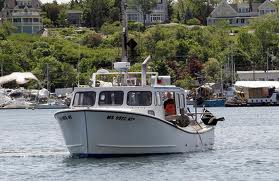
The point that seems to escape those who feel that “you guys can just go pound nails for awhile until things rebound” is that our hammer is our boat, and a boat can’t support itself in any other manner than that for which it was built – fishing.
I’ve always said that “any day that you don’t make money with your boat, you lose money with your boat”. So what the financial equation boils down to is simple – how much money do you have to lose? Because that’s the measure of how long you’ll be able to hold out. How far behind in your dockage, insurance, maintenance, mortgage, credit (debt), and emotional stability can you get before you’re forced to pull the plug, or someone else does? No Senator, we have never been confronted with a crisis of this depth before. Nor have we ever experienced such a callous, even contemptuous, attitude by those in government who are supposedly in positions of stewardship.
Do you realize who are going to be the beneficiaries of these “sustenance crumbs” which have fallen under NOAA’s banquet table will be?
The consultants, the grant writers, the lawyers who represent the consultants and grant writers, basically, the chiselers.
There is nothing here for the fisherman whose boat has set idle for months and will continue to do so until the bank repo man shows up. The fact of the matter is that the only reason why the bank hasn’t already foreclosed is that they don’t want anything to do with any “asset” that they can’t turn over at a profit, especially one which is now costing them money every day and that they have no hope of selling, because without a fishery there is no market for fishing boats!
So far The Federal Government from the bottom right on up to, and including the tippity top, have turned a blind ear and a deaf eye to our urgent predicament. Is federal relief policy in reality “too big to fail, too small to bail”?
In short, which admittedly, this response has been anything but, We need a buy-out for those who want out, and low interest debt consolidation loans combined with stabilization grants for those who want to stay in. This should be funded by SK money which NOAA along with congressional blind oversight, has been embezzling for decades We are currently in the midst of what amounts to a regulatory fishery shutdown, although no-one wants to own up to it, and desperately needed, immediate financial relief must be prioritized and fast tracked to keep us afloat until such time as we can convene a congressional inquiry into just how we got into and, more importantly, how to get out of this black hole of fisheries management.
On behalf of my colleagues, I thank you for your concern and activism on our behalf, and hope that you may view this disaster in a different light after having read this, that is, of course if you actually did!
Captain Paul Cohan, F/V Sasquatch, Gloucester, Ma.
Comment Here
————————————————————————————————
Alaska Crab Quota Owner Found Alive after 8 Years of Catch Shares and Two Days Overboard
The US Coast Guard rescued an original shareholder of Alaska king and opilio crab fishermen today, who survived for two days floating off Dutch Harbor. Sealord Ivan Fiodor Qualify, known in the fleet as “IFQ” had also won the most recent Flagstaff, Arizona amateur golf competition. He said he could not wait to get back to his armchair, collect leases, and further his addiction to watching Golf on ESPN.
Ivan had been aboard his own vessel, F/V THANKS JANE, on sea trials, and claims he fell overboard while sitting against the rail and laughing so hard that when he gagged and stood up straight, he fell backwards. The crew has been arrested on suspicion of failing to save a man overboard. But each of them claims no one saw a thing, despite Ivan the sealord saying the last thing he was telling the crew was how much Crab Ratz allowed him to “legally” charge for lease fees before paying crew for the catch, and how stupid they were for not getting original shares by going along with the privatization game 15 years ago while Ted Stevens was alive and promising them he’d give away the resource to a few people.
In their version, the crew said they were in the galley eating cake and that Ivan said he was going out on deck to take a pee. One crewman thought a whale had bumped the boat while Ivan was on deck and speculated in hindsight that it must have caused Ivan to fall over the rail. The crew was scheduled to bunk down, and it was Ivan’s turn at the helm, so no one missed him for many hours, until another crewman’s watch clock alarm went off so he could take a turn at the wheel. When they didn’t find Ivan in the wheelhouse, the crew wasn’t concerned, as that had happened many times before and Ivan was known to lock himself in his stateroom and snort lines of milk sugar – a habit he picked up as a baby when he spilled his formula mixture right after his mother weaned him.
Ivan said he stayed alive by the pure luck of finding a large black plastic buoy that was Japan tsunami flotsam, apparently used for high seas fishing, as he held onto his quota license in a passport case around his neck. He kept repeating, “I got to live, as I still have to find Jane Lubchenco and give her a big sealord recipient kiss!”
When the crew was advised by officials that he was located, and alive, they didn’t seem to care much about Ivan. One said, “Maybe next time Neptune will get him.” Another said, “He’s kind of a mean old cuss and likes to be at sea, and always complains about how lousy his home visits are, how greedy his kids are and more. I am sure they’ll be glad to have poppa back home soon.”
Maybe next time, as the catch share game ain’t over until the fat lady runs the boat and sings in her wheelhouse.
Har har
——————————————————————————————————-
Thanks Danny, The truth about Carlos Rafael hurts so had to say something!
From the Moderator
The yack coming from the waterfronts of New England is, the article written by Danny McDonald, “Carlos Rafael and His Fish Are the American Dream” has pissed off quite a few people, and who could blame ’em?
Maybe you didn’t get a chance to read it, because the other fishery websites, for some strange reason, never posted it, avoiding it like the plague.
Read the article if you haven’t already.
Carlos Rafael is talking about mosquitoes, elephant balls, and fishing, which isn’t unusual,,,,,
Rafael is currently railing against the lobbying effort of the smaller New England groundfishermen who he says are trying to put a cap on the amount of permits one individual can own.
“They are like mosquitoes on the balls of an elephant,” he says of the smaller operations in the port. “Biting, biting, biting, until finally [the government] is going to say fuck off, we got to do something.
”Sensing a significant shift in fishing rules before 2010, he horded fishing permits that would allow his boats to catch more product, spending $10 million on them. He now uses 57 permits to operate 15 full-time groundfish vessels called draggers and five part-time draggers. He operates the groundfish fleet at a loss—he estimates he’s losing a couple of million each year—but he’s still better off than the folks who only have less than a handful of permits.
“The maggots screaming on the sidelines, they’re done. They can scream all they want. Nobody can save them,” he says.
They’re screaming anyway. Smaller fishermen want federal regulators to change the rules, saying it unfairly benefits the large operations like Rafael. This pisses him off. Why should he be punished for his business acumen, he asks?
All of a sudden there’s this “in your face” information from the guy that refers to himself as “The Codfather”.
I’ll bet some people were probably even hurt reading this.
One would wonder what third, fourth generation fishermen, real fishermen, were thinking when they read that trash talk crap.
I wonder what all the Fleet diversity people think? You know, the “Who Fishes Matter’s” people?
Anyone that has lost his balls should be insulted, and that’s a lot of gelding fishermen walking around broke with nothing.
The article brings up that “us against them”, the “haves and the have not’s”. “Wall Street vs Main Street”, the “99% vs the 1%” shit.
Carlos Rafael can brag about his business acumen, but, I have to wonder, with his purchased majority stake in the ground fish industry is this the reason that a crew can bust their asses to bring in a trip of fish with a gross stock of twenty grand, and a fuel bill of sixteen grand to cover, with shit left over to share up?
Let alone money to do maintenance, or God forbid, preventative maintenance!
He told us he’s a slick, ruthless, winner take all business man.
Who knows, maybe he’s doing some of that forward selling stuff that takes the guesswork out of how much the fish will fetch, and avoiding the auction, creating a market condition of volatility for the smaller guys because his fish, and all the imported stuff have made buyers content, keeping prices low, are causing more contractions and pain that will push more out of the business, leaving him in the position to buy another permit.
When I think of the traditional New England fisherman , I think of a guy that owns a boat that is crewed by other independent self employed fishermen, and combined, they represent the ultimate free enterprise venture that has been a century’s old working model of risk taking, and profit sharing.
I haven’t spent a lot of time thinking about the multi boat fleets because when you advocate for the industry, you do it for the industry,
It is an industry that has been diverse in it’s collective make up of inshore/offshore boats, day boats, trip boats, and fleet boats, so by proxy, you advocate for a guy you wouldn’t waste your time launching a dredged from the gut, dripping loogey on.
You know the guy that has boats with secret compartments on his boats, and a robust reputation?
Rafael is a cutthroat capitalist who is perpetually at war with someone: regulators, competitors, environmentalists. He battles, forever with an eye on his profit margin.
Rafael says the groundfish industry will be completely wiped out by next year. He says that only a fifth of those currently in business will still be around by the end of 2014.
Then I start thinking about guys like Russell Sherman, who spent a lifetime busting his ass, and he’s about to unceremoniously be destroyed because of a perfect storm of circumstance from every possible direction.
I’ll let the guy that said he was made for this country finish up.
“I’m still making money.”
“Read my lips: fuck you”
—————————————————————————————————————
Fisherynation.com Editorial: The Great Atlantic Sturgeon Debacle
This Sturgeon debacle should serve as a pretty clear indication of how our fisheries “management” system works, or more to the point, how it doesn’t work.
How, by any stretch of regulation protocol, methodology, or just plain ol’ administrative integrity, can NOAA declare a species to be endangered without an assessment? Perhaps NOAA’s luminous legal department, Lois Schiffer, could give us the “legal” justification for that one— of course, as long as it’s not attorney-client privilege, or National Security classified (we certainly wouldn’t want any terrorist fishermen getting their fishy hands on that info).
What is clear about this matter is the fact that NOAA is cowed and manipulated and directed by law suit threats from the ENGOs more than by what is actually occurring in the ocean.
This is something that can be witnessed at New England Fishery Council meetings when Pew and Conservation Law Foundation lawyers arrogantly scold the council and threaten law suit consequences during the public comment period. Threats that if the council votes contrary to the wishes of Pew, EDF, CLF, Oceana, etc. there will be “consequences”. In the case of the Sturgeon law suit brought by the National Resources Defense Council, do you suppose that the then Secretary of Commerce, John Bryson, a founding member of the NRDC might have also had something to do with the endangered Sturgeon decree?
And as the ENGO World Turn’s, Oceana Inc. has filed suit against the National Marine Fisheries Service over Observer coverage!
———————————————————————————————————————–
DENIAL, DELUSION AND NMFS STILL DOESN’T KNOW ITS NAME: The third “Managing Our Nation’s Fisheries” conference was held on 6-9 May, 2013 in Washington, DC. Titled, “Advancing Sustainability,” the national event, sponsored this time by the Pacific Fishery Management Council, is in preparation for the upcoming Congressional Magnuson-Stevens Fishery Conservation & Management Act (MSA) reauthorization, a law set to expire in September of this year.
The conference included personnel from the eight regional fishery management councils, along with officials from the National Marine Fisheries Service (NMFS) and its regions, academics, fishing representatives and fishermen, and foundation and environmental organization representatives. It also attracted attention from Capitol Hill with both Senator Mark Begich (D-AK), Chair of the Senate Commerce Subcommittee on Oceans, Atmosphere, Fisheries & Coast Guard, and Representative Doc Hastings (R-WA), Chair of the House Natural Resources Committee, on hand to outline what their Committees are planning in the way of hearings on reauthorization. Rep. Hastings indicated his desire to finish MSA reauthorization this session; the past three reauthorizations have been decadal events since the Act’s passage in 1976.
This conference was regarded as an improvement over the last one, held in 2005, with a wider variety of speakers with divergent views, including “Deadliest Catch” Captain Keith Coburn (F/V Wizard). Coburn, co-keynoting the event, told participants that climate change is real, based on what he’s witnessed in the Bering Sea. This will be an interesting message for that show’s largest viewer demographic, many of whom are still “climate change deniers.”
The day prior (6 May) to the conference opening, the Pew Environmental Group held a Capitol Hill briefing on the Magnuson Act (MSA), talking about the successes achieved as a result of the 1996 and, particularly 2006, language changes to the MSA, that explicitly ordered a stop to overfishing, requiring the implementation of annual catch limits and rebuilding plans for overfished stocks, and required fishery management plans be science-based. For more, see “Despite gains, more challenges ahead for U.S. fisheries” in the 4 May Washington Post, at: www.washingtonpost.com/
Indeed, there was a great deal of chest-beating by conference organizers about how successful the MSA has been, with claims that U.S. fisheries are now the “best-managed” in the world. However, the changes made to the MSA in the past two reauthorizations were primarily the result of the efforts of the Marine Fish Conservation Network, along with groups such as Pew. The 2005 MONF conference had little bearing on the following year’s reauthorization or the biological successes in ending overfishing and rebuilding stocks achieved thus far under the Act.
Despite these biological success there is still a clamor on the Atlantic and Gulf to roll back the 2006 language to provide more “flexibility” in managing stocks. And there is increasing concern over how the stocks are being allocated, with the creation of mini-oligarchs under the individual fishing quota or catch share programs. These programs have cost jobs, siphoned off dollars from fishermen and fishing communities alike into the pockets of third party quota owners, and have or will cause a loss of access to fish stocks by many fishing communities. As an example of how little progress has been made since the last reauthorization, not one community fishing association has yet to receive any allocation of quota.
There was also a strong undercurrent of denial at the conference about addressing funding for fishery science and data collection, and other fishery needs. Poor funding — the single biggest issue facing fishery management — simply wasn’t addressed. This denial was coupled with a large dollop of delusion by those thinking better management could be achieved with less science. Climate change was acknowledged, but there was no discussion of the additional science that will be required for understanding and adapting to more frequent and radical changes in the environment resulting from global warming. Finally, there was some wishful thinking of the regional councils on display as well, such as the Pacific Council’s claimed success with its trawl groundfish “rationalization” scheme, which is still very early in implementation and still highly problematic.
And, as an example of how far our fisheries still have to go, there were all the NMFS personnel and their paraphernalia wearing “NOAA Fisheries” badges. That moniker was given back in the late Clinton or early Bush Administrations by some National Oceanic & Atmospheric Administration (NOAA) folks but has served to marginalize the importance of the nation’s fisheries ever since. True success will be measured by the restoration to full abundance of fish stocks, a rebound of the nation’s fishing communities — and NMFS’ recovery of its name. (Note a special edition of Sublegals is forthcoming giving a full report on the MONF3 conference and MSA reauthorization).
Articles taken from Fishlink Sublegals may be freely reposted or reprinted with attribution to “Fishlink Sublegals.”
————————————————————————————————
Emails? Yeah. We get emails!
Hey Bore head. No stugots if you don’t put this up!
So! (I learned that from Sam Rauch yesterday when he answered questions at the hearing).
So! A flame war has broke out between the green pampered poodles from a green mafia outfit and Bob “Boom Boom” Vannase’s Saving Seafood crew! Seems that the green poochies don’t like it when someone calls them out on the not so legit crap that they use to get the bleeding heart support buck’s.
I just read an article here at Fisherynation about a conspiracy or sumpin’ like dat, because the made guys on Boom Booms crew must’ve embarrassed ’em! Are you kiddin’ me? Fugedabout it! They should be embarrassed! Who’s that Sean kid anyway. Sound Irish to me! He writes, “It is difficult to get a man to understand something, when his salary depends on his not understanding it.” My favorite sayin’ is from my Uncle Pauly Manella, God rest his soul. He used to say. “Teach a man to fish and some creep will try ta cheat ya out of yer livelihood!
Whoa! Uncle Pauly was so frickin’ right, heh? But hey. Sellin’ used cars beat fishin’ these frickin’ days.
This cazzo di merda shoulda picked the one that says guys that live in greenhouses should never throw rock’s!
Anyway,,,, So! This all started in the last couple a days, although it’s been festerin’ for years.
Lately, though, Boom boom and his crew has been woopin’ some green ass, and these guy’s don’t like dat! The poochie brigade, led by some high paid lawyer guy from this Consternation Law outfit has been out back, diggin’ up old bones. Stayin’ true to the racing form, he brought up old news that ain’t quite true about this guy, Niles, Nils, whatever his name is, anyway, and started sayin’ he was a Capo in Bobby’s crew.
I seen this guy around for years, but had know idea he was picking up bag money from Boom Boom. But, hey. Ya never know about these inside things.
Word on the street is Nils ain’t even a made guy
All I know is dis , it’s about time someone started talkin’ the truth about the poochie pack. I hope the little ole lady’s pumpin’ out the greenbacks see these guys for what they are, because my inheritance is at stake. My mother keeps tellin me, that my success in the used car business and other entrepreneurial rackets will get me through, and I won’t need her money to survive, but the poor little animals do. I think she’s gonna leave her dough to one of these green bean tax shelter outfits! Minga!
She says that me just wastin’ it playin’ cards, and going to strip joints, and chasing the phillies around would be a sin.
Her cat Cannoli crapped out and she feels like her dough could be better used for taking care of the frickin seals.
Hey. One more thing. I really like this thing of ours! Thanks for coming up with it! I check it everyday. I hear even the Irish guy’s like it.
Thanks a lot,,, Shut up. Sal Manella Hoboken, NJ
hmm.
Catch Shares – the Experimental Drug Foundation (EDF) Prescription that you may be looking for!
Are you a Gulf of Alaska trawl fisheries permit holder who has borrowed to the hilt under government subsidized loan programs, and sick of sharing it with the crewmembers and captains who create the real capital surplus of the industry? Are you ready for ownership in an oligopolistic economic model of socialism?
Do you suffer from an inability to sleep at night because you must compete with other permit holders in a fair and competitive fishery?
Do you find yourself getting older and growing tired of hauling trawls, pots or reeling in your long line gear?
Do you have to put up with the frustrations of whales, and having to avoid the bycatch of species such as halibut and Chinook salmon?
And would you like the relief that comes from a government approved giveaway of public resources so that you can retire early from such pressures?
Then Catch Shares may be the best prescription for you! And we at Big Fish-Pharma are here to offer you total relief – at government expense, absolutely free of charge.
Warning: Catch shares may consolidate a once-free industry, cause job losses that make QS holders’ hair losses look like a bad comb-over. Wig treatments may be required. Catch shares may lead to suicide for non-recipients, and massive setbacks for once supportive fishery-dependent communities. Gifted quotas may have to be shared by interest deductions in favor of your bank. They may lead to excessive golfing which causes Arnold Palmer Foot disorder and carpal tunnel problems, as well as hip displacements, divots and consequent Turrets Syndrome (cursing at bad club swings and ball placements). Catch shares may also lead to excessive down-family sharing requests with nagging wives and daughters who want their share of the dynasty now, not in the future. Massive cash flow problems may result, as well as Bad Investor Syndrome, even though your bank and investment advisors get rich off of your awarded shares and tradable gains and losses.
If you suffer any of these reactions or warning signs, please consult the doctors at the regional fishery council. Before using Catch Shares, also consult with your life insurance agent, tax consultants, and heart specialist to see if you can endure the dosages prescribed.
If excessive guilt, feelings of deep unworthiness, and social withdrawal and loss of friends should occur, please immediately discontinue the use of Catch Share wealth quotas and consult your prescribing doctor. In the case of shortness of breath and extreme anxiety, pay a lobbyist to attend fish council meetings on your behalf and lessen your exposure to such sunlight. If an Office of Law Enforcement special agent should show up on your doorstep, refuse to cooperate and tell them to go get an attorney.
See your doctor today for a prescription of Catch Shares to make you fabulously wealthy, healthy and wise. You’ll sleep better than any captain or crew ever did!
This paid advertisement was brought to you by Dr. Jane Lubchenco and the Academy of Untrained EDF Catch Share proponents. Copies of this ad are not available in Laotian, Swahili, Spanish and Vietnamese.




































